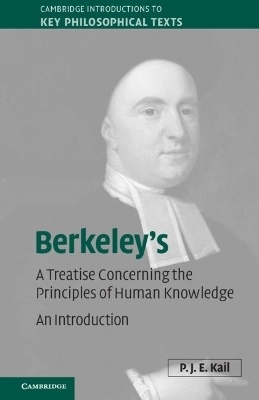
Berkeley's A Treatise Concerning the Principles of Human Knowledge
An Introduction
Seiten
2014
Cambridge University Press (Verlag)
978-0-521-17311-7 (ISBN)
Cambridge University Press (Verlag)
978-0-521-17311-7 (ISBN)
This highly readable and lucid introduction to Berkeley's Principles of Human Knowledge covers all the major topics in Berkeley's work, and provides a substantial, but lively, account of its historical context. The book deals with topics such as abstract ideas, immaterialism, God and reality, science, mathematics, the self and action.
George Berkeley's Principles of Human Knowledge is a crucial text in the history of empiricism and in the history of philosophy more generally. Its central and seemingly astonishing claim is that the physical world cannot exist independently of the perceiving mind. The meaning of this claim, the powerful arguments in its favour, and the system in which it is embedded, are explained in a highly lucid and readable fashion and placed in their historical context. Berkeley's philosophy is, in part, a response to the deep tensions and problems in the new philosophy of the early modern period and the reader is offered an account of this intellectual milieu. The book then follows the order and substance of the Principles whilst drawing on materials from Berkeley's other writings. This volume is the ideal introduction to Berkeley's Principles and will be of great interest to historians of philosophy in general.
George Berkeley's Principles of Human Knowledge is a crucial text in the history of empiricism and in the history of philosophy more generally. Its central and seemingly astonishing claim is that the physical world cannot exist independently of the perceiving mind. The meaning of this claim, the powerful arguments in its favour, and the system in which it is embedded, are explained in a highly lucid and readable fashion and placed in their historical context. Berkeley's philosophy is, in part, a response to the deep tensions and problems in the new philosophy of the early modern period and the reader is offered an account of this intellectual milieu. The book then follows the order and substance of the Principles whilst drawing on materials from Berkeley's other writings. This volume is the ideal introduction to Berkeley's Principles and will be of great interest to historians of philosophy in general.
Dr P. J. E. Kail is University Lecturer in the History of Modern Philosophy, University of Oxford and Fellow and Tutor in Philosophy at St Peter's College, Oxford. He is co-editor with Marina Frasca-Spada of Impressions of Hume (2005) and author of Projection and Realism in Hume's Philosophy (2007).
1. Introduction; 2. Context and aims; 3. The Introduction to the Principles; 4. The argument for immaterialism; 5. Against the philosophers: the refutation of materialism; 6. Reality and God; 7. Science and mathematics; 8. Spirits.
| Erscheint lt. Verlag | 15.5.2014 |
|---|---|
| Reihe/Serie | Cambridge Introductions to Key Philosophical Texts |
| Zusatzinfo | Worked examples or Exercises |
| Verlagsort | Cambridge |
| Sprache | englisch |
| Maße | 136 x 213 mm |
| Gewicht | 220 g |
| Themenwelt | Geisteswissenschaften ► Philosophie ► Geschichte der Philosophie |
| Geisteswissenschaften ► Philosophie ► Logik | |
| Geisteswissenschaften ► Philosophie ► Metaphysik / Ontologie | |
| Geisteswissenschaften ► Philosophie ► Philosophie der Neuzeit | |
| Geisteswissenschaften ► Religion / Theologie | |
| ISBN-10 | 0-521-17311-6 / 0521173116 |
| ISBN-13 | 978-0-521-17311-7 / 9780521173117 |
| Zustand | Neuware |
| Haben Sie eine Frage zum Produkt? |
Mehr entdecken
aus dem Bereich
aus dem Bereich
die kolonialen Wurzeln der französischen Theorie
Buch | Hardcover (2024)
Matthes & Seitz Berlin (Verlag)
CHF 41,90
eine Geschichte der Zuversicht von Homer bis zum Klimawandel
Buch | Hardcover (2024)
C.H.Beck (Verlag)
CHF 39,20


